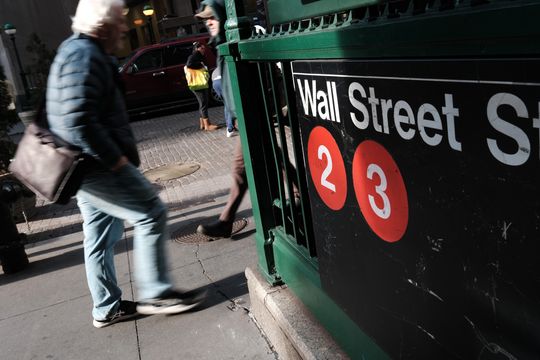Dow posts biggest monthly percentage decline since September
Stocks closed a rough February with losses on Tuesday, with the Dow booking the sharpest monthly drop since September, as rising interest rates and the drag of stubborn inflation in the U.S. and abroad rattled investors.
How stocks traded
- The Dow Jones Industrial Average DJIA, -0.71% dropped 232.39 points, or 0.7%, ending at 32,656.70, the lowest close since Nov. 9, according to Dow Jones Market Data.
- The S&P 500 SPX, -0.30% fell 12.09 points, or 0.3%, closing at 3,970.15
- The Nasdaq Composite COMP, -0.10% shed 11.44 points, or 0.1%, finishing at 11,455.54
The S&P 500 closed February down 2.6%, while the Nasdaq Composite fell 1.1%, the worst monthly declines for each since December, according to Dow Jones Market Data. The Dow shed 4.2%, its biggest monthly drop since September. Still, tech stocks remained popular in February, with the Nasdaq up nearly 9.4% for the year to date.
What drove markets
Stocks lost steam in the final hour of trading Tuesday on evidence that high inflation is proving sticky in developed economies, forcing bond yields higher. Investors were also weighing consumer-facing earnings results and domestic data on housing and the consumer’s mood.
“I think the retail customer is going to be the focus this week,” said Brian Overby, senior market strategist at Ally, adding that while recent earnings reports from Target Corp. TGT, +1.01% and Walmart Inc. WMT, +0.49% have been fairly decent, top executives also have been striking a cautionary tone on consumer spending going forward.
“The fact that we have such a resilient consumer has really kept the markets at bay,” Overby said.
On deck next for Wednesday are earnings from Lowe’s Cos. LOW, +0.74%, Kohl’s Corp. KSS, -1.30% and Dollar Tree Inc. DLTR, +1.01%.
In the past, stock-market investors would cheer a strong consumer, but they’re not now, as wages climb and as the Federal Reserve tries to tamp down inflation, including by raising interest rates into restrictive territory.
By several key measures, the Fed already has made notable progress in raising borrowing costs. Yields on Treasury debt, including the 2-year note, have increased sharply in February. The yield on the 2-year note TMUBMUSD02Y, 4.832% held near 4.8%, almost a 16-year high Tuesday. At the same time, the rate on the 6-month Treasury bill TMUBMUSD06M, 5.140% hit 5.14% on Tuesday, near the highest level since February 2007.
Even so, high costs of living have remained a global dilemma for central banks. Data from France and Spain on Tuesday showed consumer-price increases accelerating this month, raising the prospects that the main eurozone inflation numbers for February, due Thursday, will come in hotter than forecast.
This follows last Friday’s U.S. PCE reading, which also pointed to inflation proving more stubborn than hoped.
Heightened concerns about tighter Fed monetary policy had the S&P 500, Dow and Nasdaq each on pace to end February with a loss, while also booking their worst monthly declines since December, according to preliminary Dow Jones Market Data.
Even with all the downward pressure, some investors see buying opportunities. That’s what might be explaining the mixed ground for the moment with the tech-heavy, growth-oriented Nasdaq in positive territory, said Josh Markman, partner at Bel-Air Investment Advisors.
“Right now, when you look at what’s cheap, I think people are feeling that growth stocks are — on a relative basis to where they’ve been, a good value,” Markman said.
Information technology stocks gained 0.3% in February, the only S&P 500 sector to end the month in the green, according to FactSet data.
Overby at Ally said high inflation and elevated interest rates likely boil down to a “choppy” landing for the U.S. economy, leaving the stock market prone to daily swings of 1% or more, based on good or bad news. “It’s so hard being in this market and trying to give it a direction,” he said. “If we get back to the October lows, I think you would have a strong buying opportunity.”
Government data showed the trade deficit in goods increased 2%, to $91.5 billion last month, a three-month high. Retail inventories increased 0.3%, while wholesale inventories decreased 0.4%.
Meanwhile, consumer confidence dropped in February, decreasing to 102.9 from 106. That’s a three-month low for the gauge from the Conference Board. The Case-Shiller home-price index for January dropped 0.5% in December, the sixth monthly decline.
Companies in focus
- Paramount Global PARA, -3.03% shares dropped 3% Tuesday, after The Wall Street Journal reported that the company rejected a bid from former executive David Nevins to buy its Showtime streaming service for more than $3 million.
- Goldman Sachs Group Inc. GS, -3.80% shares fell 3.7% Tuesday as the investment bank kicked off its first investor day in three years, with CEO David Solomon saying the bank will focus on wealth management and investment banking, after disclosing in January a $3 billion loss since 2020 in its consumer-lending unit.
- Target Corp. TGT, +1.01% shares added 1.1% on the heels of the retailer’s fourth-quarter earnings. Target’s revenue, profit and earnings per share all beat analyst expectations, but its outlook was below FactSet consensus. That includes an expected $1.50 to $1.90 adjusted EPS compared with a FactSet consensus of $2.15.
- Shares of J.M Smucker Co. SJM, -0.11% shed 0.1% after earnings results from the consumer and pet foods company. The company beat on its earnings and raised its outlook on earnings per share.
- Norwegian Cruise Line Holdings Ltd. NCLH, -10.18% shares tumbled 10.1% after a wider-than-expected loss in the cruise operator’s earnings results, despite a revenue beat.

